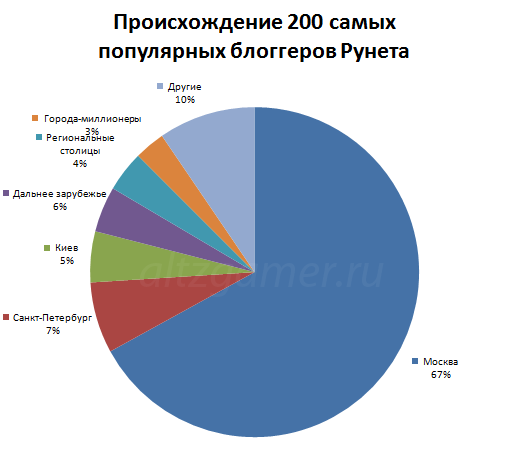Territorial asymmetry of the Russian-language blogosphere
Analyzed the territorial origin of the most popular Runet bloggers according to Top Yandex and got the following picture. Muscovites occupy 67% (134 bloggers) in the Top-200. In second place - Peter, then Kiev.

The asymmetry of the Russian-speaking blogosphere largely repeats the asymmetry of Russia / the post-Soviet space in many other areas (for example, among the State Duma deputies of the last convocation, the proportion of Muscovites is about 50 %, but here the other bias is 40% from St. Petersburg). On the one hand, many of the top bloggers are hired bloggers working for PR agencies / writers who lead a blog as a supplement to the mainstream work, working in Moscow.
')
On the other hand, the effect of scale plays when even a super-popular local blogger fails to outdo an average Muscovite or St. Petersburg man simply due to the impossibility of recruiting a sufficiently large number of interested users.
It is worth noting that according to the latest Spylog data , Moscow is already concentrating a significantly smaller share of Russian-speaking users compared to previous years. If earlier the share of the capital exceeded half, then in October its share was about 35.5% (and continues to decline). With that, the population of Moscow is 7.4% of the total population of Russia and 6.4% of the total Russian-speaking population (meaning the figure of 167 million people according to Elena Yatsenko ).
It can be assumed that the reason for this asymmetry is the well-established structure of the Russian media space. People are used to watching news on federal (read, Moscow) TV channels (the situation is somewhat different with radio and newspapers, where the local factor plays a more important role). But the analogy with TV suggests itself. Sensations, humorous sketches, non-capital residents bring their habits to the blogosphere, where they subscribe to popular bloggers with Moscow registration.
Of course, such a factor as the history of the development of broadband access is of great importance - if in Moscow massive broadband access came in 2002-2003, then to major cities two years later. Due to this lag, blogger (mainly LJ) communities with celebrities managed to form in Moscow (it’s worth noting that there aren’t too many “Runet classics” in the TOP 200 - they can be counted on the fingers: Subject, Norwegian Forest, Exler, Kaganov and a couple of others) and their hierarchy of authorities. Later, these structures were projected onto the common Internet landscape.
It seems logical that as the proportion of Muscovites in the general audience of the Russian-speaking Internet decreases, the share of bloggers will also decrease. However, taking into account that the observed tendency to preserve center-peripheral differences will constantly maintain the discrepancy between the share in the population, the share in the Internet audience and the share among the most popular bloggers.

The asymmetry of the Russian-speaking blogosphere largely repeats the asymmetry of Russia / the post-Soviet space in many other areas (for example, among the State Duma deputies of the last convocation, the proportion of Muscovites is about 50 %, but here the other bias is 40% from St. Petersburg). On the one hand, many of the top bloggers are hired bloggers working for PR agencies / writers who lead a blog as a supplement to the mainstream work, working in Moscow.
')
On the other hand, the effect of scale plays when even a super-popular local blogger fails to outdo an average Muscovite or St. Petersburg man simply due to the impossibility of recruiting a sufficiently large number of interested users.
It is worth noting that according to the latest Spylog data , Moscow is already concentrating a significantly smaller share of Russian-speaking users compared to previous years. If earlier the share of the capital exceeded half, then in October its share was about 35.5% (and continues to decline). With that, the population of Moscow is 7.4% of the total population of Russia and 6.4% of the total Russian-speaking population (meaning the figure of 167 million people according to Elena Yatsenko ).
It can be assumed that the reason for this asymmetry is the well-established structure of the Russian media space. People are used to watching news on federal (read, Moscow) TV channels (the situation is somewhat different with radio and newspapers, where the local factor plays a more important role). But the analogy with TV suggests itself. Sensations, humorous sketches, non-capital residents bring their habits to the blogosphere, where they subscribe to popular bloggers with Moscow registration.
Of course, such a factor as the history of the development of broadband access is of great importance - if in Moscow massive broadband access came in 2002-2003, then to major cities two years later. Due to this lag, blogger (mainly LJ) communities with celebrities managed to form in Moscow (it’s worth noting that there aren’t too many “Runet classics” in the TOP 200 - they can be counted on the fingers: Subject, Norwegian Forest, Exler, Kaganov and a couple of others) and their hierarchy of authorities. Later, these structures were projected onto the common Internet landscape.
It seems logical that as the proportion of Muscovites in the general audience of the Russian-speaking Internet decreases, the share of bloggers will also decrease. However, taking into account that the observed tendency to preserve center-peripheral differences will constantly maintain the discrepancy between the share in the population, the share in the Internet audience and the share among the most popular bloggers.
Source: https://habr.com/ru/post/287640/
All Articles